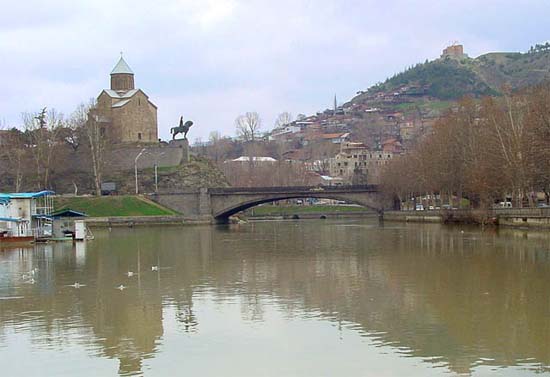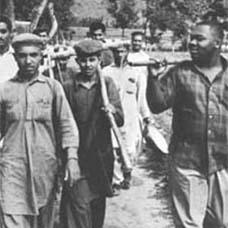
Since March 2001, the United States Peace Corps arrived in Georgia to help the towns and villages in which they live.
Heating solutions for Georgian schools: jumping jacks
Peace Corps volunteers continue mission of friendship, teaching English and creative classroom approaches along the way
By Ashley Howard
In March 2001, the United States Peace Corps arrived in Georgia at the invitation of the Georgian government. Now in its fourth year, Peace Corps Georgia volunteers continue the Peace Corps' mission of using their skills to help the regional towns and villages in which they live.
Begun in 1964, the program sends American volunteers to developing countries around the world where they use their expertise to work with the local people on health education, improving business skills, English language instruction, water purification management, and environmental preservation, as well as a number of other projects, depending on the country.
In Georgia, the primary program partners volunteers with Georgian teachers to teach English at rural secondary schools throughout the country. Currently, 41 volunteers are in the country, with 52 more arriving in June. Volunteers work everywhere except South Ossetia, Abkhazia, and Zugdidi due to political instability. There are also no volunteers in Tbilisi, Peace Corps staff explains, because of its comparatively developed status.
The education program works loosely with the Ministry of Education and the World Bank's Georgian education development program. When Peace Corps began operation in the country, they jointly drafted a "Memorandum of Understanding" with the Ministry that sought to define the roles of the volunteer educators and make sure these were consistent with the ministry's own goals.
Much of the work at the ministry level is "getting information to them about what the volunteers are doing and how they are doing things," says Education Program assistant Asmat Sikharulidze, although as Program and Training Officer Janeen Dorsch explains, there are "no systematic meetings."
Dorsch, who runs the personnel aspects of the program, is a nine-year veteran of Peace Corps. She began her involvement as a volunteer, spending three years in Macedonia and later serving as the training officer in that country, as well as in Kiribati, a small island nation in the Pacific Ocean.
She has worked in Georgia as the program's training officer since 2003, taking over from the original training officer, Maura Fulton, who was with the program from the beginning. The director of operations in Georgia, Van Nelson, has been part of the Peace Corps for 35 years.
"Educational volunteers are not only teaching," says Dorsch, "they also branch out into the community."
Volunteers have secondary projects at the school or within the community in which they live. Current projects include the repair of dilapidated gymnasiums in Telavi and Khashuri, the organization of workshops for teachers to introduce new teaching methods, and attempting to raise funds to provide basic school supplies for an English language specialty school in Poti.
Although still focused primarily on English education in secondary schools, Peace Corps operations branched out in 2003 with the addition of a program that places volunteers with small Georgian Non-Governmental Organizations (NGOs).
Like schools, NGOs must apply and submit to a screening process where Peace Corps staff examines their mission, operations, and site to determine if volunteers would be able to help the organization forward its mission.
The bulk of volunteers remain committed to teaching, with only nine currently working with such NGOs as the Democratic Development Center in Chiatura and the Gori Information Center.
Many NGOs work with the local government, and Peace Corps staff are examining possibilities of placing future volunteers directly within local government operations to help in municipal administration and health organizations.
Peace Corps in Georgia has encountered a number of obstacles, most obvious among them the poor state of Georgian infrastructure. Physically, poor roads and uncertain electricity supply make communication and travel difficult.
Volunteers also particularly feel it when there are delays in payment of teachers' salaries, not least because it means teachers may be unable to devote more time to education, despite their desire to do so, because of financial pressure.
Other difficulties are similar to those found by Peace Corps operations all over the world: cultural differences and linguistic barriers.
One obstacle faced by Peace Corps programs everywhere is suspicion from the native people over "why rich Americans come to poor Georgia," as Program Manager of NGO Development Tika Revishvili describes it.
This program seeks to diminish the Georgians' suspicions by explaining what Peace Corps programs have done in the past and what they are currently doing. "The volunteers themselves are the most effective way to dispel suspicion," says Revishvili. "The relations they build with people are the best demonstrations of what we do."
Word of mouth also helps people understand the mission of the Peace Corps. "It's a small country," says Dorsch. "People have relatives everywhere. We don't go unnoticed."
This is certainly true of volunteers Terrell Starr, based in Vani, and Steve Taylor, who is working in a school in Kakheti, who are collaborating to create a model United Nations program in each of their schools.
Starr explains he chose to open the program, where students each assume the role of a United Nations ambassador and hold meetings according to parliamentary rules, because "kids in the regions have few opportunities, and this will help develop their problem solving, leadership, diplomatic, and social skills."
Starr and Taylor, along with twelve other volunteers, are also involved in a Partnership Project, a Peace Corps version of a grant proposal, to help fund teacher training workshops in six cities.
The workshops are designed to help 150 poorly trained English teachers make the most of limited resources in teaching English. Money received will go towards photocopies, pens, and other basic supplies necessary to run the workshops.
The lack of materials is a problem faced by Georgian and volunteer teachers alike. "You just have to wing it," says volunteer Drew Whitmarsh, who is working in Chiatura, Imereti.
"All you have is your creativity in your brain," he adds, describing leading students in jumping jacks to warm up in classrooms without heat, and making frequent use of the blackboard to get around the shortage of books.
Whitmarsh, Starr and Taylor all say they were unprepared for the lack of materials and indoor heating, adding that the training and introduction given to volunteers upon their arrival in Georgia in no way prepared them for the realities of their teaching experience.
"You have to re-evaluate what you have," says Taylor. "And how to work with what you have."
"You adjust and learn as you go," says Starr, explaining that to solve the problem of the lack of paper at his school, Starr scavenges paper from the Peace Corps' office so that students can practice their English writing on the backs of extra printouts.
Despite the difficulties and problems, however, all three agree that the experience is worth it. Starr sums up their feelings, saying, "Seeing smiles on the kid's faces because they know that I'm willing to come and work for free brings joy to me."
For more information about Peace Corps or how to support Partnership Projects, visit www.peacecorps.gov.
Ashley Howard is visiting Georgia on an academic trip together with other students from ??? and ???. She is contributed this article to The Messenger.
Site Meter GeREs Statistics
© The Messenger. All rights reserved. Please read our disclaimer before using any of the published materials.











